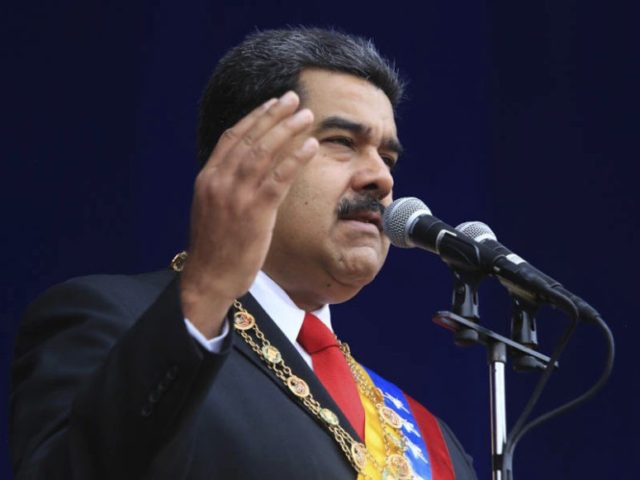Socialist tyrant Nicolas Maduro is cracking down hard on Venezuelan media in his bid to retain power, shutting down television stations and yanking radio hosts off the air if they dare to mention any number of banned topics, according to reports surfacing this weekend.
According to a report at the UK Telegraph on Sunday, two local television stations in the city of Maracaibo were taken off the air on the day interim President Juan Guaidó took the oath as interim president for the “crime” of broadcasting his inauguration. Equipment belonging to the stations was seized or destroyed by government forces.
A popular national radio host named Cesar Miguel Rondón found himself taken off the air after 30 years for talking about Guaidó, so he has turned to Internet streaming:
The government’s National Telecommunications Commission (CONATEL) had told his station not to mention Mr Guaidó, Rondón told the Telegraph. Other sources in Venezuela say banned topics also include protests, detentions, the topic of violence or specific acts of violence.
“They suggested to me that I don’t do telephone interviews… and I didn’t,” Rondón said, “but the brief description that I gave of the events that happened was enough to break the guidelines.”
Rondón says on Jan 24 – the day after Mr Guaidó was recognised by the US and a host of other countries as interim president – a CONATEL official arrived and told the station administration to either terminate his programme or they would close the station.
“Before, I had received other pressure but after the 23 of January, the repression and the censorship has been terrible,” Rondón said.
The Telegraph quoted Venezuelan press freedom advocates who cataloged at least 50 cases of physical threats against journalists and the detention of ten foreign journalists last month. Some of the foreign journalists were subsequently released, and in some cases deported, after complaints from their home governments.
Nervous media outlets are steering away from political coverage in fear of the mercurial censorship guidelines. “To avoid trouble, some stations have resorted to only playing music,” the Telegraph reported.
Deutsche Welle noted foreign journalists are beginning to have a suspiciously difficult time obtaining visas and those who dare enter the country without papers face harsh punishment. Some Venezuelan officials claim public unrest is making it difficult for the bureaucracy to fulfill visa applications in a timely manner. Journalism groups like Reporters Without Borders countered with accusations that journalist visas are being abused as an instrument of control.
“Even if it could be accessed, a proper accreditation would likely take 30 days – far too long to be able to report on the ground about current developments in the country. And so, as is often the case when working in crisis zones, foreign journalists are faced with a dilemma. On the one hand, they must respect entry visa regulations, which are often arbitrarily designed to hinder journalistic work. On the other hand, they want to report on what is happening as quickly as possible, get the latest information and be in a position to corroborate it,” Deutsche Welle wrote.
The Associated Press reported on Sunday that Venezuela’s state-run media provider CANTV is not only throttling Guaidó’s access to radio and television, it has also “blocked access to social media sites at least four times.”
CANTV controls about 70 percent of Venezuela’s Internet connections and half of its mobile networks. According to a European watchdog group called Netblocks, CANTV blocked Facebook, Instagram, Twitter, and YouTube during nearly all of the speech Guaidó gave when he was sworn in as interim president.
Studies have found dozens of websites blocked in Venezuela, ranging from news operations and political websites to Guaidó’s Wikipedia page. Additionally, Venezuelans are subjected to a huge amount of disinformation from phony social media accounts.
“Rights groups say the targeted disruptions show that methods to silence critics are becoming increasingly sophisticated in Venezuela, where internet providers have been hindering access to news sites and illegal currency exchange sites since 2014,” the AP reported.
The AP mentioned theories that Venezuela accomplishes this Internet censorship using either tools developed in Russia or techniques pioneered by Western companies to combat the spread of terrorist information and recruiting online.

COMMENTS
Please let us know if you're having issues with commenting.